|
|
|
Sort Order |
|
|
|
Items / Page
|
|
|
|
|
|
|
| Srl | Item |
| 1 |
ID:
149178
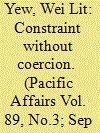

|
|
|
|
|
| Summary/Abstract |
How can we begin to understand “repression” when a soft authoritarian regime like Malaysia both tolerates yet simultaneously hinders environmental contention? I argue that addressing indirect repression in the form of state-imposed constraints is one such point of departure. Beneath the veneer of tolerance, repression still exists in subtler forms. Such unobserved constraints emerge mainly through non-coercive bureaucratic processes and procedures undertaken by state agents. Though aggregated effect may not defeat a movement, it nevertheless elevates the overall cost of collective action by circumscribing movement forms and options, and demobilizing resources and supporters. This perspective goes beyond the conventional issue_image_89_3_Environmental Protest Malaysia - EA photo1attention on coercion—the show and use of force—in non-democracies. Based primarily on activist accounts related to the Broga anti-incinerator campaign and the Kuantan protests against a rare earth plant in Malaysia, this article demonstrates how indirect repression, in the form of state-imposed constraints, is perceived, experienced, and responded to by activists. I point to four prominent ways in which the constraints indirectly undermine activists’ campaigns: ostentatious surveillance, judicial channelling, occupational repression, and administrative constraints. Intended or otherwise, constraints seem less costly than coercion and help absolve political rulers of direct culpability. Besides completing the picture of repressive patterns under authoritarianism in Malaysia, this article’s focus on constraints suggests that the authoritarian state is ambivalent about grassroots activism that does not challenge the political order.
|
|
|
|
|
|
|
|
|
|
|
|
|
|
|
|
| 2 |
ID:
169725
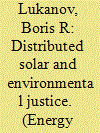

|
|
|
|
|
| Summary/Abstract |
The rapid growth of distributed solar adoption in California provides an opportunity to lower electricity bills for the adopters and realize additional community benefits, including grid resilience and lower grid emissions. It is unclear, however, whether this transition is occurring equitably across the state's various demographic and socioeconomic groups and whether historically disadvantaged environmental justice (EJ) communities have been able to exploit the bill savings and other associated benefits of rooftop solar. Here we analyze the cumulative and annualized (spatial and temporal) rates of PV adoption across California and compare those with data from the state's cumulative impact EJ methodology (CalEnviroScreen). We find persistently lower levels of PV adoption in disadvantaged communities, suggesting clear distributive and equity impacts of existing PV support policies, and indicating that the benefits bypass some of the state's most vulnerable populations. The analysis reveals strong correlation of solar adoption with not only socioeconomic variables, but also with health, environmental and demographic indicators, contributing to our growing understanding of the role these factors play in household clean-energy adoption trends. The results provide a baseline from which to develop more effective policies, strategically design incentives, and track the efficacy of existing solar programs that target disadvantaged communities.
|
|
|
|
|
|
|
|
|
|
|
|
|
|
|
|
| 3 |
ID:
180151
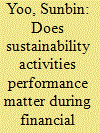

|
|
|
|
|
| Summary/Abstract |
As a market for sustainability investing is growing rapidly, understanding the impact of environmental, social, and governance (ESG) activities on firms’ financial performance is becoming increasingly important. In this study, we examine the effect of ESG performance on stock returns and volatility during the financial crisis resulting from the coronavirus (COVID-19) pandemic. To quantify the impact, we use company-level daily ESG score data and United Nations Global Compact (GC) score data. In our dataset, ESG scores indicate ESG performance that is deemed important to financial materiality, and the GC score indicates the firm reputation for following UN rules. Our results indicate that during the pandemic, an increase in the ESG score, especially the E score component, is related to higher returns and lower volatility. Conversely, increasing GC scores is correlated with lower stock returns and higher volatility. In addition, we find that firms in lower return groups benefit more than other firms. Focusing on energy sector impacts, we show that although the non-energy sector benefits more than the energy sector from increasing E scores, energy sector firms can still reduce their stock price volatility by increasing these scores. Our study offers significant implications for ESG investment strategies during financial crises.
|
|
|
|
|
|
|
|
|
|
|
|
|
|
|
|
| 4 |
ID:
161246


|
|
|
|
|
| Summary/Abstract |
The number of slums in India are ever increasing. According to the Census Report (2011), the slum population in India comprises of 22.4 million of the population which is 17.36% of the total population of India. One of the major reasons for this ever expanding slum population is the constant process of urbanisation. Urbanisation of the rural dwellers and migration to the cities creates population deletion in rural areas and bulging of the same in the urban areas.
|
|
|
|
|
|
|
|
|
|
|
|
|
|
|
|
| 5 |
ID:
170835


|
|
|
|
|
| Summary/Abstract |
Combating climate change at a global scale requires dramatic
mobilization of capital markets. By 2035, more than $53 trillion will need to
be invested in energy supply and efficiency in order to achieve climate targets
laid out in the 2015 Paris Agreement. Interest and participation in sustainable
finance continues to grow: environmental, social, and governance (ESG)
investing assets under management totaled $30.7 trillion (of which $1 trillion is
specifically classified as sustainability-themed) at the start of 2018, representing
a 34% increase over the preceding two years. Yet, the capital that is available
for investment in sustainable assets may not be well-matched with the pipeline
of projects in search of financing. Green asset classes, including renewable
generation, infrastructure, energy efficiency, and clean transport, are often
inherently novel, small, and/or disaggregated. This makes them difficult and
expensive to combine into investment-ready formats, preventing capital from
being deployed on the timescale required to enable a quick energy transition.
Moreover, market barriers exist with respect to early-stage financing and proving
the viability of new markets and business models. In this article, we explore
the hurdles and barriers that financial actors must overcome to ensure efficient
capital matching that bridges the gap between climate awareness and meaningful
climate investment
|
|
|
|
|
|
|
|
|
|
|
|
|
|
|
|
| 6 |
ID:
138752


|
|
|
|
|
| Summary/Abstract |
This article explores how the Abe administration might go about improving Japan's relationship with the South Korean government of President Park Geun-hye. Although bilateral ties are strained by disagreements over history, territory, and the “comfort women” issue, as well as mutual mistrust and “fatigue,” the paper argues that the two sides actually share substantial interests in common and urges Japanese leaders not to lose hope but to continue working hard to improve relations. It lays out a menu of policy “options” across political-diplomatic; security; economic; educational and socio-cultural; and environmental and scientific domains, and describes a strategy for how to build a better relationship over the next several years.
|
|
|
|
|
|
|
|
|
|
|
|
|
|
|
|
| 7 |
ID:
178262


|
|
|
|
|
| Summary/Abstract |
Drought is a major challenge threatening agricultural productivity in uMsinga. The occurrence of drought is expected to increase in coming decades, intensifying in severity, duration and the way people are affected by drought. The objective of this study is to understand small-scale farmers’ and rural communities’ perceptions of drought, its environmental and socio-economic impacts, adaptive and mitigation measures at household level and their satisfaction with the government’s role in drought management in the community. The study utilized a combination of quantitative and qualitative research methods, in the form of questionnaires, focus groups and key informant interviews. The sample size for the research study was 180 respondents for the questionnaire component and a total of 30 respondents for the focus groups and key informant interviews. The results show that increased levels of poverty, food insecurity and increased migration were the main socio-economic impacts perceived by respondents. Water scarcity, crop failure, forest degradation and an increase in average temperatures were perceived by respondents as the main environmental impacts caused by drought in uMsinga. Respondents perceived drought as a serious threat to agricultural production and adopted various indigenous adaptive strategies. A majority of respondents adopted a reactive approach to drought management, and therefore did not adopt many mitigation measures.
|
|
|
|
|
|
|
|
|
|
|
|
|
|
|
|
| 8 |
ID:
166346
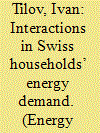

|
|
|
|
|
| Summary/Abstract |
This article analyzes the interactions and possible trade-offs between direct energy consumption and embodied energy requirement of households in Switzerland in order to assess the net impacts of standard energy policies focusing exclusively on direct energy use. Direct and embodied energy demand of Swiss households are estimated by combining consumption data of a national expenditure survey with data on energy intensity from life-cycle analysis. Using a system of equations and an instrumental variable approach, we find that both domains are driven by same determinants, but that there is no evidence for significant substitution between them. We also find an increasing effect of income on both domains, with particularly important effects on embodied energy. From a policy perspective, our findings highlight a concern that economic growth could bring about an increasing global energy demand through energy requirement for non-energy commodities. However, the wide-spread policies targeting direct energy are unlikely to cause a substantial shift in household consumption to embodied energy.
|
|
|
|
|
|
|
|
|
|
|
|
|
|
|
|
| 9 |
ID:
084279


|
|
|
| 10 |
ID:
079963


|
|
|
|
|
| Publication |
2007.
|
| Summary/Abstract |
China's burgeoning civil society has often been characterized as state-led or corporatist. However, these concepts fail to capture the current dynamics of Chinese social activism, as they cannot account for two of its critical features. First, the fact that the nature of Chinese state-society relations is not a matter of the former dictating the latter, but rather a kind of "negotiated symbiosis." Second, the semiauthoritarian context necessitates that China's social activists develop a diffuse, and informal rather than formal, network of relations. This informal web of relations has yielded undeniable political as well as societal legitimacy. It is against this background that we put forward the concept of "embedded social activism." Since its initial emergence, environmental activism has resourcefully adapted to, rather than opposed, the political conditions of its era. The hallmark, and in fact, the success of China's reforms lie in their strategy of incremental change. Therefore, we might view embedded environmentalism as a transient phase which is itself changing through time, a transitional feature of a burgeoning civil society in a semiauthoritarian context
|
|
|
|
|
|
|
|
|
|
|
|
|
|
|
|
| 11 |
ID:
172083
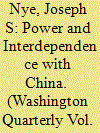

|
|
|
| 12 |
ID:
141053


|
|
|
|
|
| Summary/Abstract |
At the outset of the twenty-first century, the world is facing a range of problems, including environmental, economic, and security risks, that increasingly challenge the logic of nation-state governance. While American and European models of International Relations and global governance, such as the Westphalian system of states and the Washington Consensus, have come under attack from poststructuralist thinkers, political philosophers from China and Taiwan have tried to reconceptualise the world of the twenty-first century from their own perspectives. This article examines current streams of Chinese International Relations theorising and confronts them with the case of territorial disputes in the East China Sea. The article analyses the arguments by Chinese realists, ‘worldists’, and procedural constructivists, showing how Chinese scholars creatively revive pre-modern Chinese political theory in attempts to provide new ways in which International Relations scholars might view the world, or: ‘all-under-heaven’. I argue that these contributions will progressively challenge conventional theories of International Relations, while at the same time contending that so-called non-Western theorising, if it is to contribute to IRT, will require additional rigorous empirical grounding, a critical perspective on its entanglement with nationalist political discourses in East Asian societies, and the willingness to incorporate existing theories.
|
|
|
|
|
|
|
|
|
|
|
|
|
|
|
|
| 13 |
ID:
085331
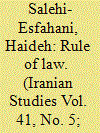

|
|
|
|
|
| Publication |
2008.
|
| Summary/Abstract |
The ancient Persian empires are denoted as despotic, practicing arbitrary rule while Greece, Persia's archrival during the sixth to fourth century BC, exercised rule of law. This paper uses a contract theory framework to analyze some of the geographical and environmental underpinnings of the existence of rule of law in the city-states of ancient Greece and its absence in Persia. I discuss the role of geographical conditions of land (open plains versus mountains), population pressure, proximity to the sea and form of trade (overland versus overseas) as factors conducive to rule of law in the city-states of ancient Greece and to despotism in ancient Persia. Specifically, the role of trade via land in Persia prior to the fifth century BC is compared to the role of sea trade (alongside with piracy) in ancient Greece. I argue that in ancient Persia monarchs could tax or expropriate much of the gains from overland trade, preventing the accumulation of an independent form of wealth by merchants. In Greece, sea trade alongside the practice of piracy led to gains from trade that could not be easily expropriated by the monarchs and acted as a balancing force vis- -vis the power of the monarchs, creating a basis for rule of law in the Greek city-states.
|
|
|
|
|
|
|
|
|
|
|
|
|
|
|
|
|
|
|
|
|